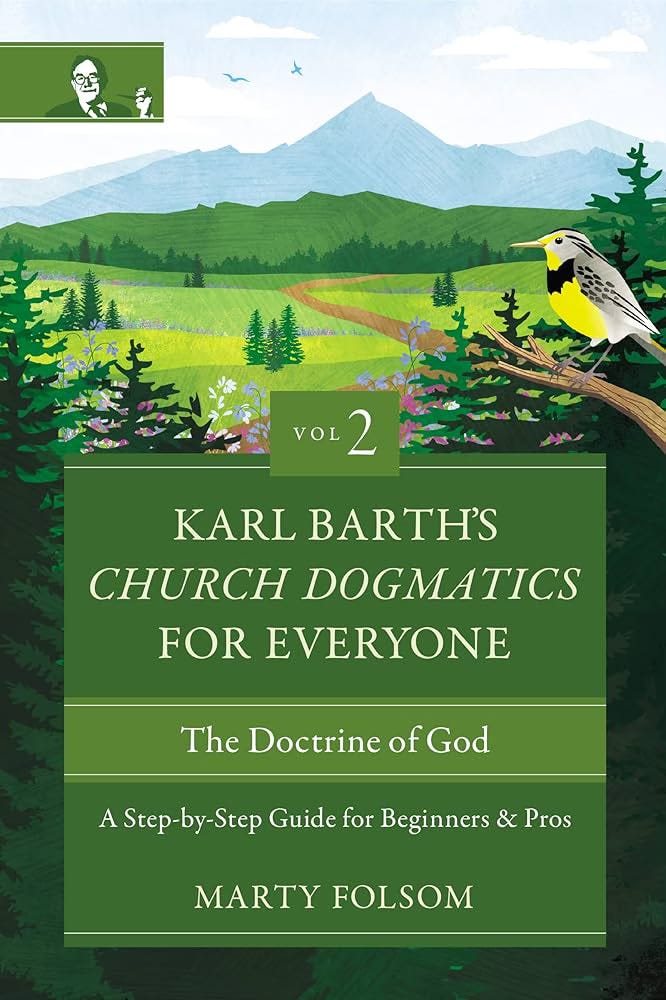Here is a recent conversation with Marty Folsom about his latest book, Karl Barth’s Church Dogmatics for Everyone, Volume 2---The Doctrine of God: A Step-by-Step Guide for Beginners and Pros.
About the book:
A Guided Tour of One of the Greatest Theological Works of the Twentieth Century
Karl Barth's Church Dogmatics is considered by many to be the most important theological work of the twentieth century. For many people, reading it and understanding its arguments is a lifelong goal. Its enormous size, at over 12,000 pages (in English translations) and enough print volumes to fill an entire shelf, make reading it a daunting prospect.
Karl Barth's Church Dogmatics for Everyone, Volume 2--The Doctrine of God helps bridge the gap for Karl Barth readers from beginners to professionals by offering an introduction to Barth's theology and thought like no other. User-friendly and creative, this guide helps readers get the gist, significance, and relevance of what Barth intended for the church... to restore the focus of theology and revitalize the practices of the church.
Show Notes
Summary
In this conversation, Marty Folsom discusses his new book on volume two of Karl Barth's Church Dogmatics. He explains how Barth's theology emphasizes the importance of a dynamic relationship with God, where God speaks and invites us to respond. Folsom uses the metaphor of music to convey the idea of participating in this relationship and invites readers to sing along with Barth's theology. He also explores Barth's rejection of natural theology and his critique of the Nazi co-optation of Christianity. Folsom highlights the significance of community and conversation partners in engaging with Barth's work. The conversation explores the themes of the holistic nature of theology, the relevance of Karl Barth's dogmatics in everyday life, and the style and purpose of Barth's writing. It emphasizes the importance of understanding theology as a relational and transformative endeavor that involves active participation and dialogue. The conversation also touches on the themes of hospitality, playfulness, and the journey of restoration. The guests discuss the emotional impact of theological concepts and the moments that have moved them to tears.
Takeaways
Barth's theology emphasizes the importance of a dynamic relationship with God, where God speaks and invites us to respond.
The metaphor of music is used to convey the idea of participating in this relationship and singing along with Barth's theology.
Barth rejects natural theology, which seeks to understand God through human wisdom and inclinations, and instead emphasizes the need to understand God on God's own terms.
Barth critiques the Nazi co-optation of Christianity and emphasizes the importance of understanding God's character and intentions before engaging in other theological discussions.
Community and conversation partners are essential for engaging with Barth's work and deepening our understanding of theology. Theology should be understood as a holistic and relational endeavor that encompasses all aspects of life.
Karl Barth's dogmatics have relevance and implications for everyday life, including professions, relationships, and societal structures.
The style of Barth's writing, characterized by repetition, metaphor, and musicality, is intended to engage readers emotionally and invite them into a transformative encounter with God.
Hospitality, playfulness, and the journey of restoration are key themes in Barth's theology.
Theological concepts can have a profound emotional impact and move individuals to tears.
Sound Bites
"The nature of what makes relationships work is that we recognize that as persons, we need the other person to be in dialogue with us."
"God's work in our lives sets us free to live in a particular way, trusting in His promises."
"The nature of music is to invite the reader to sing. It allows for creativity and a dynamic relationship with God."
"We have lost our curiosity for the implications of what a world looks like that has been arranged so that a loving, caring concern for one another, originated from God, is able to work itself out in every aspect of human being, through the arts, through the sciences."
"There is no arena of life that is outside of the implications of what Karl Barth invites us into."
"We're each valued for the dynamics we bring and our disciplines don't give us value. It's who we are in Christ."



















Share this post